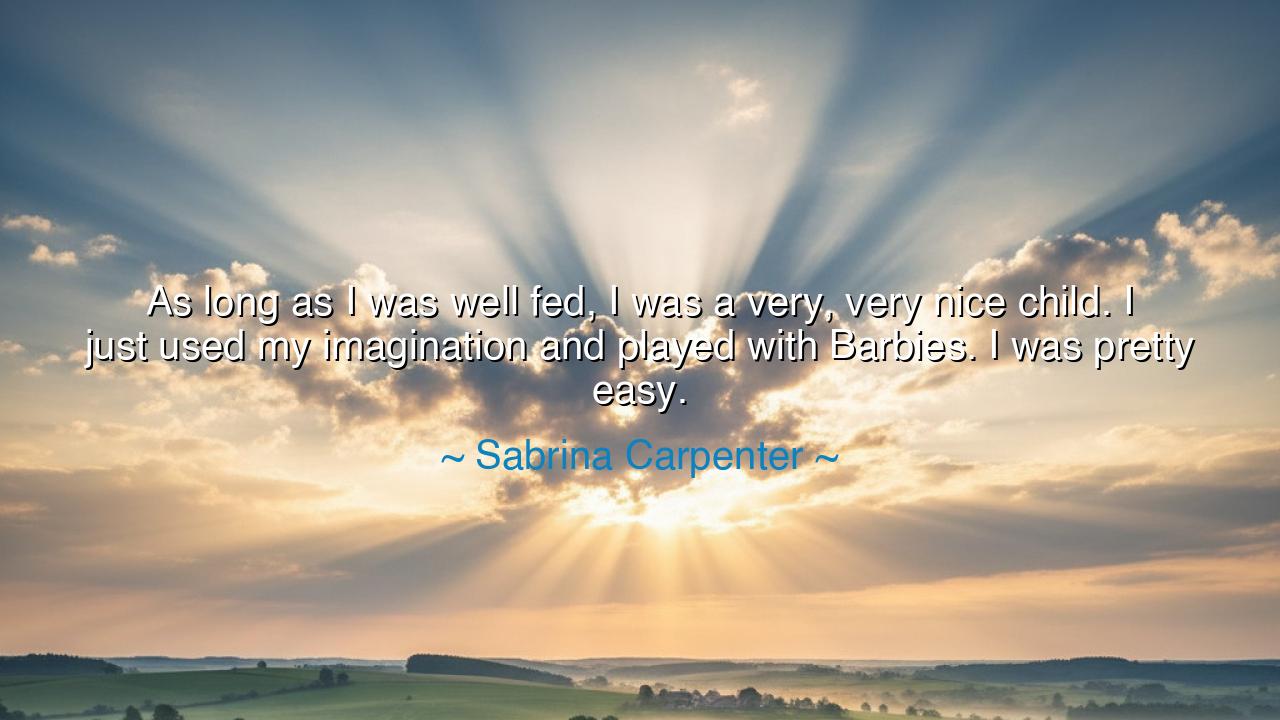
As long as I was well fed, I was a very, very nice child. I just
As long as I was well fed, I was a very, very nice child. I just used my imagination and played with Barbies. I was pretty easy.






“As long as I was well fed, I was a very, very nice child. I just used my imagination and played with Barbies. I was pretty easy.” – Sabrina Carpenter
In this simple and unassuming reflection, Sabrina Carpenter, a voice of her generation, reveals a truth that stretches far beyond her childhood — a truth that has echoed through centuries of human existence. Her words may seem lighthearted, almost playful, yet within them lies a gentle wisdom: that peace, kindness, and creativity flourish when our most basic needs are met, and when the imagination is free to roam without fear or hunger. She speaks not only of her own youth, but of the timeless harmony between nourishment and creativity, between the body’s contentment and the soul’s awakening.
When she says, “As long as I was well fed, I was a very, very nice child,” she offers a lesson both practical and profound. It reminds us that kindness often depends upon balance, that the heart cannot sing when the body is starving. The child, like the artist, requires care before creation. Hunger — whether of the body or of the spirit — makes beasts of even the gentlest souls. But when one is nourished, even in small and humble ways, imagination blossoms. Carpenter’s reflection is thus a metaphor for human nature itself: peace follows fulfillment, and creativity follows peace.
Her second truth is even more radiant — “I just used my imagination and played with Barbies. I was pretty easy.” Here we glimpse the holy innocence of childhood, that pure and wondrous age when the imagination knows no bounds, and joy can be fashioned from the simplest things. In her play, she was not merely passing time; she was learning to create worlds, to give voices to the silent, to breathe life into the lifeless. Every great artist begins this way — not with resources, but with imagination. The divine gift of creativity often first appears in the act of play, when the soul is still unburdened by judgment or fear.
Consider the story of Walt Disney, who, as a boy, sketched animals on scraps of paper and daydreamed among the fields of Missouri. His early life was not filled with wealth or luxury; his greatest treasure was imagination. From those quiet days of drawing came the worlds of Mickey, of Snow White, of entire kingdoms that now live in the collective heart of humanity. Disney’s genius, like Carpenter’s childhood, was born from the same simple foundation — a nourished heart and an unrestrained imagination. When the soul is fed, even the humblest materials — paper, dolls, dreams — can become portals to eternity.
Carpenter’s words also remind us of the fragile, sacred link between simplicity and joy. The ancients taught that to live well is to live in harmony — not in constant striving, but in gratitude for what is. Her childhood contentment reveals that happiness does not demand grandeur; it requires only presence, nourishment, and the freedom to imagine. Many in our age, grown weary with excess, have forgotten this ancient wisdom. We chase what dazzles, and lose what delights. Yet this young artist speaks like a sage, teaching us that joy, like fire, is kindled from the smallest spark when the heart is fed and free.
But let her words also carry a warning. When the imagination is neglected, when the simple needs of the spirit — food, rest, love, wonder — are ignored, the human being becomes restless, cold, and divided. A starving soul cannot dream; an overburdened mind cannot create. The lesson here is not only for children, but for all who seek meaning: feed both your body and your imagination, for each sustains the other. To deny either is to wither.
So, dear listener, take this teaching into your life: tend to your nourishment, both physical and spiritual. Eat with gratitude, rest with purpose, and give your imagination time to play, as Carpenter once did. Turn away from the noise of the world and let simplicity guide you. Create without fear of judgment; imagine without limit. In doing so, you will rediscover what every wise soul and every child knows — that happiness, creativity, and kindness spring not from abundance, but from balance.
Thus, from Sabrina Carpenter’s gentle recollection arises a timeless truth: the well-fed heart is a kind heart, and the free imagination is the seed of creation. Nurture both, and you will find that life itself becomes easier — not because it is less demanding, but because you will meet it with joy, wonder, and peace.






AAdministratorAdministrator
Welcome, honored guests. Please leave a comment, we will respond soon